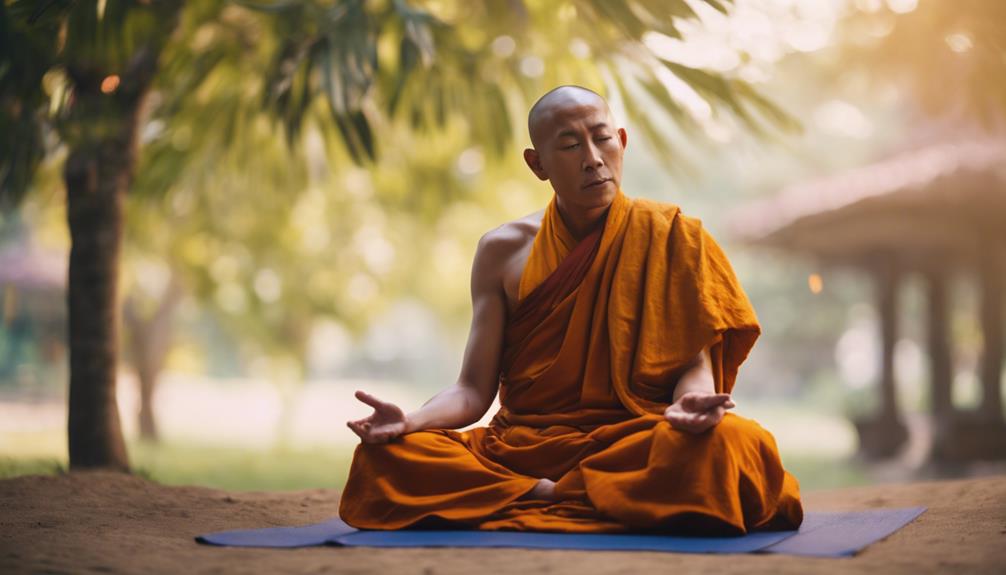Is Yoga a Buddhist Thing?
Yoga isn't exclusively Buddhist, yet its practices of mindfulness and meditation align with Buddhist philosophy. The origins of Yoga trace back to ancient India, widening its influences from various traditions, including Buddhism. Although you'll find a deeper connection between Yoga and Hinduism, Buddhism also plays a substantial role in shaping unique Buddhist Yoga styles. Both paths guide towards enlightenment, promoting inner peace, self-awareness, and ethical living. Further exploration will help you understand yoga's diverse philosophies and how its practices, intersecting with Buddhism, enhance mind-body harmony and well-being.
Key Takeaways
- Yoga originates from ancient Indian traditions, while Buddhism is rooted in Nepal, both influencing each other's practices.
- Buddhist Yoga styles incorporate mindfulness, meditation, and ethical guidelines from Buddhist teachings.
- Yoga emphasizes self-realization and unity with divine energy, while Buddhism focuses on interdependence and freedom from suffering.
- Practices like Metta Yoga, Vipassana Yoga, Zen Yoga, and Tibetan Yoga integrate Buddhist principles with yoga techniques.
- Yoga complements Buddhism by enhancing mental focus, mindfulness, resilience, and inner peace.
Understanding Yoga's Origins

To fully understand the roots of yoga, it's important to explore its rich and complex history, which dates back thousands of years to ancient Indian spiritual traditions. This practice has evolved over the centuries, incorporating elements from different cultures and belief systems. Yet, at its core, it's a reflection of the human desire for spiritual growth and self-awareness.
Now, let's consider yoga's global popularity. You can find yoga studios in virtually every city worldwide, and millions practice it daily. This universal adoption underlines yoga's efficacy in promoting physical and mental well-being. However, it's essential that we also consider the cultural appropriation of yoga. As you adopt these practices, be aware of their historical and cultural significance and respect them.
Moreover, understand that yoga is more than just physical exercise; it's a holistic approach to well-being. Its practices transcend the mat, extending to your lifestyle and thought patterns. Hence, even as you relish the innovation infused into modern yoga by the West, remember its roots, appreciate its depth, and respect its cultural significance.
Buddhism: A Brief Overview
To grasp the connection between Buddhism and yoga, you need to understand some basic principles of Buddhism. It's a philosophy that encourages self-awareness, compassion, and mindfulness – concepts also integral to yoga.
Additionally, Buddhism's influence on yoga isn't just philosophical; it's also evident in the physical practices.
Buddhism's Fundamental Principles
Diving into Buddhism's fundamental principles, you'll find a rich tapestry of beliefs and practices, central to which are the Four Noble Truths and the Eightfold Path.
The Four Noble Truths outline the inherent suffering in life and its cessation, offering a practical framework for understanding human existence.
The Eightfold Path, on the other hand, provides a systematic approach to spiritual growth, incorporating wisdom, ethical conduct, and mental discipline. It's an innovative model, urging personal development rather than reliance on divine intervention.
These principles aren't just philosophical conjectures, but actionable paths that guide Buddhists towards enlightenment.
In this innovative system, the intellectual and the spiritual coalesce, offering a roadmap for self-improvement and transcendence.
Buddhism's Influence on Yoga
While the principles of Buddhism offer a roadmap for self-improvement and transcendence, you'll find its impact is also evident in the practice of yoga. This influence has led to the development of distinct styles of 'Buddhist Yoga', integrating ideas from the Theravada tradition.
In your exploration, you'll notice:
- The presence of mindfulness, a core Buddhist concept, in yoga sequences.
- The implementation of Theravada's focus on self-discipline and concentration.
- The integration of Buddhist meditation techniques into yoga.
- The emphasis on ethical conduct, mirroring the Buddhist precepts.
These integrations aren't just an overlap of philosophies; they're a purposeful fusion, enhancing the transformative potential of yoga. So, yes, yoga can be a 'Buddhist thing,' but it's more apt to say Buddhism has innovatively influenced yoga's evolution.
Yoga and Hinduism: The Connection

Exploring the roots of yoga leads us inevitably to its profound connection with Hinduism, deeply intertwined and hailing from the same spiritual and cultural environment. Hindu deities in yoga form the core of this connection, with many postures and sequences named after them. Consider Hanumanasana, inspired by the monkey god Hanuman, or Natarajasana, a tribute to Shiva, the lord of dance.
Yoga's sacred texts, like the Bhagavad Gita and the Upanishads, are Hindu scriptures. They contain the philosophical underpinnings of yoga's practices, outlining paths to enlightenment such as karma yoga (the path of action), jnana yoga (the path of knowledge), and bhakti yoga (the path of devotion). They serve as guideposts on the yogic journey, enriching the physical practice with profound spiritual wisdom.
While yoga has transcended its roots, morphing into various styles and techniques globally, its essential connection to Hinduism remains. This connection is more than historical or cultural; it's a spiritual synergy that underscores yoga's ultimate purpose – the quest for self-realization and unity with the divine. So, while yoga may be influenced by various philosophies and traditions, it's important to acknowledge its Hindu origins.
Impact of Buddhism on Yoga
You might wonder how Buddhism has influenced yoga.
The intertwining of these two ancient traditions can be seen in practices shared between them, such as meditation.
Let's examine these connections and how they've shaped yoga as it's understood today.
Buddhism's Influence on Yoga
Often, people don't realize that many yoga practices have been greatly influenced by Buddhist teachings. This influence has led to the development of unique Buddhist Yoga styles.
In exploring Yoga's influence on Buddhism, we can identify several key areas:
- The incorporation of mindfulness and meditation, central tenets of Buddhism, into Yoga.
- The adaptation of Buddhist philosophies into Yoga's ethical guidelines.
- The use of Buddhist mantras and chants in Yoga practices.
- The integration of Yoga into Buddhist monastic routines.
This cross-pollination hasn't only enriched Yoga's repertoire but also fostered a deeper understanding of our interconnectedness. It's through this lens that we can truly appreciate the symbiosis between Yoga and Buddhism.
Interlinking Yoga and Buddhism
Let's now turn our attention to how the interlinking of Yoga and Buddhism, particularly the impact of Buddhism on Yoga, has further evolved these practices.
Over time, Buddhist Yoga adaptations have influenced Yoga's spiritual aspects, infusing them with Buddhist teachings and philosophies. This seamless blending has enhanced Yoga's focus on mindfulness, compassion, and the pursuit of enlightenment.
It's important to understand, however, that while Buddhism has greatly influenced Yoga, it hasn't entirely defined it. Yoga retains its distinct identity, with its origins in ancient Indian philosophy.
The interplay between these two practices has led to a symbiotic relationship, each enriching the other. This cross-pollination has opened up innovative avenues for practitioners seeking holistic wellness, mental clarity, and spiritual growth.
Meditation: A Shared Practice
Buddhism's influence on Yoga is perhaps most evident in the shared practice of meditation, a critical tool in both disciplines for fostering mindfulness and achieving spiritual enlightenment. This shared practice underscores the profound impact Buddhism has had in shaping various yoga styles.
Both yoga and Buddhism leverage meditation to:
- Increase self-awareness
- Reduce stress and anxiety
- Cultivate compassion
- Enhance emotional health
The mindfulness benefits derived from meditation are plentiful and impactful, promoting a healthier, more balanced lifestyle. These include improved mental clarity, emotional intelligence, and a greater sense of inner peace.
Notable Similarities Between Yoga and Buddhism
In exploring the shared principles between yoga and Buddhism, you'll find striking similarities that intertwine their spiritual, philosophical, and meditative aspects. Concepts like mindfulness, detachment, and the pursuit of enlightenment are hallmarks of both 'Buddhist Yoga' and 'Yogic Buddhism'.
Here's a comparative table shedding light on these commonalities:
| Aspect | Buddhism | Yoga |
|---|---|---|
| Mindfulness | Central to Buddhist meditation, helping followers observe and understand the nature of reality. | Integral to yoga practice, fostering awareness of body, breath, and emotions. |
| Detachment | Encourages detachment from worldly desires and suffering, leading to Nirvana. | Advocates detachment from materialistic attachments, aiding in spiritual growth. |
| Pursuit of Enlightenment | The ultimate goal is achieving Buddha-hood or enlightenment. | Aims for self-realization or Samadhi, a state of supreme consciousness. |
These similarities don't imply that yoga is a Buddhist thing, but rather that they share some philosophical underpinnings. It's fascinating how these ancient practices, though distinct, converge in their intent to promote spiritual growth and inner peace. These intersections could be the result of their common geographic and cultural origins, or they might suggest a shared human yearning for spiritual understanding and transcendence.
Crucial Differences: Yoga Vs Buddhism

When considering similarities between Yoga and Buddhism, it's crucial to recognize that they've distinct origins and philosophical underpinnings. Their practices and techniques, while sometimes overlapping, serve different spiritual and philosophical goals.
Let's explore these key differences to gain a clearer understanding of each.
Yoga and Buddhism Origins
Despite their common association with spiritual practices, yoga and Buddhism have distinct origins and fundamental differences you'll want to understand. Yoga's roots lie in ancient India where it was a philosophy before becoming a physical practice. Its health benefits, like mental relaxation and enhanced flexibility, are renowned.
On the other hand, Buddhism emerged from Nepal, focusing on societal impact through ethical living and mindfulness.
Here are a few key differences:
- Yoga, primarily a physical practice, is rooted in Hinduism while Buddhism is a holistic, philosophical approach.
- Yoga aims to unite the individual self with the universal consciousness. Buddhism seeks to attain Nirvana, a state of liberation from suffering.
- Yoga uses asanas (poses) for spiritual growth; Buddhism uses meditation.
- Yoga is mostly individualistic; Buddhism centers around community (Sangha).
Philosophical Differences
Diving deeper into the philosophical differences, you'll find that yoga and Buddhism each offer unique paths to spiritual enlightenment. There's an intriguing divergence in the domains of Yogic Philosophy and Buddhism's Adaptations.
Here's a snapshot of the same:
| Yogic Philosophy | Buddhism's Adaptations |
|---|---|
| Focuses on self-realization | Emphasizes on interdependence |
| Seeks unity with the divine | Seeks freedom from suffering |
| Uses physical practices | Uses mindfulness and meditation |
| Believes in cosmic energy | Believes in the Four Noble Truths |
Both systems have their unique perspectives and practices. Yoga aims for a union with the divine energy, whereas Buddhism seeks liberation through understanding the nature of reality. The physical aspect of yoga contrasts with Buddhism's mental focus. Both are profound paths, yet they steer you towards enlightenment in different ways.
Practices and Techniques
In examining the practices and techniques, you'll notice fundamental differences between yoga and Buddhism that further distinguish these two spiritual paths. While both involve meditation, their approaches and objectives differ vastly.
- Yoga's Health Benefits: Yoga emphasizes physical postures, flexibility, and breath control, providing tangible health benefits like enhanced fitness and stress relief.
- Yoga Apparel Trends: Yoga has spurred a movement in fitness fashion, with innovative, comfortable, and stylish wear becoming a norm.
- Buddhist Meditation: Buddhism focuses on mindfulness and understanding the nature of reality, not necessarily physical fitness.
- Buddhist Robes: Buddhism doesn't have a fashion trend but maintains traditional robes, symbolizing simplicity and detachment.
Intersect of Yoga and Zen Buddhism

You'll find fascinating connections between yoga and Zen Buddhism, both of which explore the world of mindfulness and self-awareness. Zen postures, for instance, are central to the practice, akin to the asanas in yoga. These poses, whether sitting or standing, aim to optimize the flow of life energy, the same principle that yoga adheres to.
However, the correlation doesn't end with physical postures. The philosophies of Yoga ethics and Zen teachings align as well. Both emphasize the importance of right conduct, inner peace, and compassion towards all living beings. This shared focus on ethical behavior and self-discipline bridges the gap between the physical and spiritual, grounding both practices in the domain of conscious living.
Innovation in the domain of mindfulness is about merging traditions to create synergistic practices. The intersect of yoga and Zen Buddhism does just that. By understanding the shared principles and techniques between these two, you can enrich your own practice, whether you're a dedicated yogi, a Zen practitioner, or just beginning your journey into mindfulness.
This insightful convergence proves that yoga isn't just a Buddhist thing but rather a universal discipline that transcends individual philosophies and religions.
Yoga Practices in Buddhist Traditions
Within the domain of Buddhist traditions, yoga practices hold a significant place, often acting as a conduit for meditation and mindfulness. These practices, deeply rooted in the teachings of the Buddha, aren't just physical exercises. They're tools for cultivating a profound sense of inner peace and clarity.
Yoga's Theravada influence has shaped the following Buddhist Yoga Styles:
- Metta Yoga: This yoga style focuses on the cultivation of loving-kindness and compassion towards all beings.
- Vipassana Yoga: An introspective practice that encourages self-examination and mindfulness.
- Zen Yoga: A yoga practice that incorporates Zen teachings, emphasizing on moment-to-moment awareness.
- Tibetan Yoga: This style includes physical postures, breath control, and meditative practices designed to promote overall well-being.
These practices promote a holistic approach to well-being, integrating body, mind, and spirit. They offer innovative solutions to contemporary challenges of stress and disconnection. By engaging in these practices, you're not only improving your physical health but also cultivating qualities like compassion, mindfulness, and equanimity. Essentially, Buddhist yoga styles aren't just a series of postures; they're a pathway to inner tranquility and insight.
Is Yoga a Path to Buddhist Enlightenment?

Can yoga be considered a pathway to Buddhist enlightenment? The answer isn't as straightforward as it may seem. Buddhist Yoga isn't just a set of physical exercises. It's a deep, intricate system, combining elements of meditation, mindfulness, and ethical living. Its aim isn't just to improve physical health, but to aid in the enlightenment journey.
While traditional yoga and Buddhist practices have different origins, their convergence in Buddhist Yoga creates a unique path to achieving enlightenment. This path isn't purely physical, nor purely spiritual. It's a holistic approach, engaging your mind, body, and spirit in a harmonious pursuit of self-realization.
However, it's essential to remember that enlightenment isn't a destination, but a continuous journey. Buddhist Yoga can serve as a tool, a guide, a companion on this journey. It can help you cultivate mindfulness, foster compassion, and live ethically – all central tenets of Buddhism.
Personal Interpretation: Yoga and Buddhism
In exploring the intersection of yoga and Buddhism, it's important to recognize that your personal interpretation and application of these practices can greatly shape your spiritual journey. You may find that the physical discipline of yoga complements the mental focus of Buddhism, thereby aiding in your pursuit of mindfulness and inner peace.
Yoga's impact on your body and mind can be profound, especially when combined with Buddhist mantras. This spiritual synthesis can allow you to:
- Deepen your meditation practice through yoga's postures and breathing exercises.
- Cultivate mindfulness and tranquility by repeating Buddhist mantras.
- Experience a greater sense of unity and interconnectedness as yoga and Buddhism both emphasize the interconnectedness of all things.
- Develop resilience and equanimity in the face of life's challenges, a key tenet of Buddhist philosophy.



